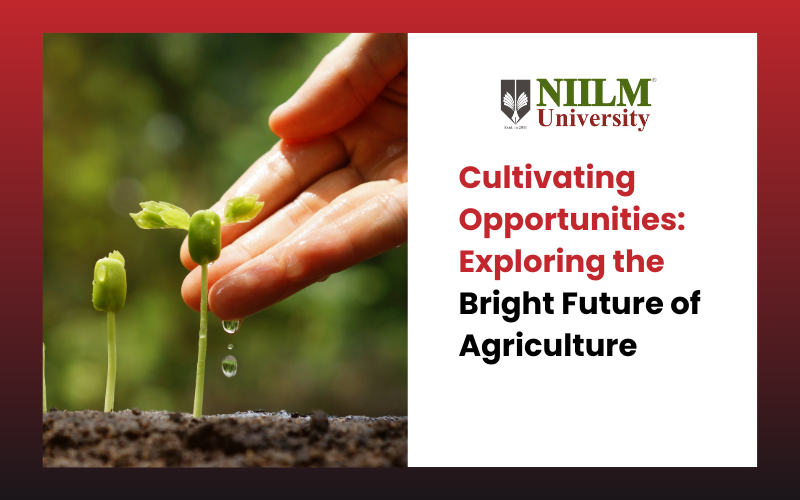Admission Enquiry

Delve into the promising future of agriculture, highlighting innovative practices, emerging trends, and abundant career opportunities in the field.
In a world facing unprecedented challenges such as climate change, population growth, and food insecurity, agriculture stands as both a beacon of hope and a field ripe with opportunities. From sustainable farming practices to technological innovations, the agricultural sector is undergoing a profound transformation, offering a wealth of possibilities for those willing to embrace change and innovation. In this blog, we delve into the exciting opportunities that lie ahead in agriculture and the potential they hold for shaping a brighter future for our planet and its people.
Sustainable Agriculture: Cultivating Harmony with Nature
At the heart of agriculture's future lies the imperative of sustainability. With ecosystems under increasing strain from intensive farming practices and climate change, there is a growing recognition of the need to adopt more sustainable approaches and subjects in b sc agriculture to food production . This presents a myriad of opportunities for farmers, entrepreneurs, and innovators to explore alternative farming methods that prioritize environmental stewardship, soil health, and biodiversity conservation.
From regenerative agriculture techniques that restore degraded soils and sequester carbon to agroforestry systems that integrate trees into farming landscapes, there are countless ways to cultivate food in harmony with nature. Moreover, the growing demand for organic and locally sourced produce presents an opportunity for farmers to adopt practices that reduce reliance on synthetic inputs and minimize transportation emissions.
Technological Innovation: Empowering Agriculture for the 21st Century
In an era defined by rapid technological advancement, agriculture stands to benefit immensely from innovations that enhance productivity, efficiency, and resilience. From precision farming technologies that optimize resource use to autonomous drones that monitor crop health, the possibilities are virtually limitless. These technological innovations not only enable farmers to produce more with less but also offer new avenues for value creation and market differentiation.
For instance, the rise of vertical farming and hydroponics presents an opportunity to grow fresh produce in urban environments, reducing the need for long-distance transportation and minimizing the environmental footprint of food production. Similarly, advancements in genetic engineering and biotechnology hold the potential to create crops that are more resistant to pests, diseases, and environmental stressors, thereby increasing yields and enhancing food security.
Entrepreneurship and Market Innovation: Seizing the Moment
Beyond the farm gate, there are ample opportunities for entrepreneurs and investors to drive positive change in the agricultural sector. Whether it's developing innovative food products, creating distribution networks that connect farmers with consumers, or investing in sustainable agriculture ventures, there are countless ways to leverage business acumen for social and environmental impact.
Moreover, the growing interest in alternative protein sources such as plant-based meats and cultured meats presents a promising opportunity to diversify the food supply chain and reduce the environmental footprint of animal agriculture. By harnessing consumer demand for ethical and sustainable food products, entrepreneurs can catalyze a shift towards a more equitable and resilient food system.
Agriculture is the backbone of the Indian economy. It contribIt contributes about 16% of the total GDP producing employment to more than 60% population of our country. Agriculture not only provides food, fibre, feed, fuel, medicines, but indirectly supplements all raw materials used in our daily life. Most importantly it involves crop production, forestry, fisheries, livestock and post harvest management.
India's population is increasing at an alarming rate and to feed such a big population with limited land and water resources is the most challenging task. The basic target is to maximize agricultural production by reducing the cost of inputs through technological interventions. For this skilled human resource is required therefore agriculture education has taken a sharp shift in recent times.
There are large number of employment opportunities in the field of Agriculture which are listed in a very effective way as under:
Professional degree to have your own set-u: Entrepreneurship - Apiculture, Mushroom, Floriculture, Gardening Activities, Livestock & Poultry, Goatery Management, Aquaculture, Organic Farming, Agri. Marketing Stores, Agri-Engineering Workshops , Contract Farming, Agri- Industries, etc.
Higher Education: Post Graduation (M.Sc. Ag) and Doctoral Degree (Ph.D) in any one of the different branches of Agriculture (11) and many more.
-Agri-Business Management
-Market Forecasting Agencies
Job opportunities :
Public sector -Govt. Agri. Depts., Agriculture Universities -Teaching, Research and Extension activities
Agriculture is the backbone of the Indian economy.
Conclusion
In conclusion, the future of agriculture is brimming with opportunities for those willing to embrace change, innovation, and collaboration. Whether it's adopting sustainable farming practices, harnessing the power of technology, or exploring new market opportunities, there has never been a more exciting time to be involved in agriculture. By working together to cultivate a more sustainable, equitable, and resilient food system, we can ensure that future generations inherit a world where the bounty of the earth is nurtured and cherished for years to come.
Copyrights © 2024 NIILM UNIVERSITY. All rights reserved.